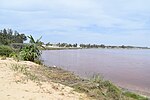Dunaliella is a single-celled, photosynthetic green alga, that is characteristic for its ability to outcompete other organisms and thrive in hypersaline...
25 KB (3,222 words) - 20:43, 19 October 2024
Dunaliella salina is a type of halophile unicellular green algae especially found in hypersaline environments, such as salt lakes and salt evaporation...
12 KB (1,417 words) - 10:09, 10 November 2024
the presence of salt-tolerant algae that produces carotenoids, such as Dunaliella salina, usually in conjunction with specific bacteria and archaea, which...
13 KB (1,382 words) - 06:10, 14 December 2024
The pink colour is believed to be due to the presence of the organism Dunaliella salina. The Extreme Microbiome Project, part of the Association of Biomolecular...
11 KB (1,195 words) - 21:25, 23 July 2024
Dakar, in northwest Africa. It is named for its pink waters caused by Dunaliella salina algae and is known for its high salt content, up to 40% in some...
9 KB (847 words) - 19:16, 12 May 2024
chromatography. It is industrially extracted from richer sources such as the algae Dunaliella salina. The separation of β-carotene from the mixture of other carotenoids...
34 KB (3,540 words) - 16:49, 17 December 2024
20% w/v), in which the eukaryotic chlorophyte, Dunaliella salina, can be tentatively identified. Dunaliella salina is grown commercially for the carotenoid...
62 KB (6,489 words) - 21:15, 27 December 2024
saturated, due to the presence of beta-carotene pigment caused by the alga Dunaliella salina. Wangkangurru (also known as Arabana/Wangkangurru, Wangganguru...
25 KB (2,717 words) - 23:55, 17 October 2024
is used for the production of magnesium chloride. The water contains Dunaliella salina algae that give a reddish shade to the lake. At the bottom of the...
5 KB (367 words) - 03:57, 21 November 2024
Lake Hillier shoreline with microorganisms including Dunaliella salina, red algae which cause the salt content in the lake to create a red dye...
21 KB (2,165 words) - 01:35, 28 November 2024
also bacterial halophiles and some eukaryotic species, such as the alga Dunaliella salina and fungus Wallemia ichthyophaga. Some well-known species give...
23 KB (2,750 words) - 11:12, 9 October 2024
BioNumbers. Retrieved 9 October 2011. "Cell dry weight - Green algae Dunaliella salina". BioNumbers. Retrieved 14 October 2011. "A quick introduction...
79 KB (4,550 words) - 05:30, 31 October 2024
tetragonoides warrigal greens, kōkihi, sea spinach Hygro Eu (seawater) Dunaliella (a green alga) Hydro Eu (seawater) Sesuvium portulacastrum sea purslane...
12 KB (1,231 words) - 08:36, 27 November 2024
The Syvash may appear red in color due to the salt-tolerant micro-alga Dunaliella salina. The eastern parts of the Syvash contain less salt and are home...
7 KB (665 words) - 16:59, 23 October 2024
species Other orders that have been recognized include: Dunaliellales – Dunaliella and Dunaliellaceae are placed in Chlamydomonadales by AlgaeBase Chlorococcales...
9 KB (1,105 words) - 20:01, 18 October 2024
β-carotene can be extracted from fungus Blakeslea trispora, marine algae Dunaliella salina or genetically modified yeast Saccharomyces cerevisiae, starting...
112 KB (12,687 words) - 15:39, 22 December 2024
beta-carotene pigment that colours it in late summer, caused by the algae Dunaliella salina. This area was the site of a major salt industry from 1916 to 1975...
6 KB (549 words) - 13:34, 7 September 2024
Upasani and Desai (1990). More recently, haloalkaliphilic microalgae namely Dunaliella, Euhalothece, Nitzchia, etc. have also been isolated (Bhatt H. H.and Upasani...
19 KB (1,795 words) - 22:53, 29 September 2024
β-carotene is produced by Aquacarotene Limited from dried marine algae Dunaliella salina grown in harvesting ponds situated in Karratha, Western Australia...
23 KB (2,691 words) - 14:45, 30 November 2024
University of Jerusalem found it to be teeming with an alga called Dunaliella. Dunaliella in turn nourished carotenoid-containing (red-pigmented) halobacteria...
81 KB (8,479 words) - 20:38, 23 December 2024
the pond increases. In low- to mid-salinity ponds, green algae such as Dunaliella salina are predominant, although these algae can also take on an orange...
12 KB (1,291 words) - 19:23, 24 December 2024
and species adapted for this environment, such as Artemia salina and Dunaliella salina, are important to bird life. Coral reefs, sea grass beds, and mangrove...
115 KB (13,004 words) - 07:51, 17 December 2024
The distinctive colour of the water changes is a result of green alga Dunaliella salina, halobacterium Halobacterium cutirubrum, and/or high concentration...
9 KB (946 words) - 07:51, 15 November 2024
9-cis-beta-carotene, a version of β-carotene extracted from the marine algae Dunaliella salina was shown to be absorbed by some of the patients, allowing their...
11 KB (1,318 words) - 18:05, 6 September 2024
marsh beds. Sometimes it has a faintly pink tinge from the presence of Dunaliella salina, a type of pink microalga commonly found in salt marshes. However...
21 KB (2,280 words) - 03:44, 27 December 2024
is a bacterium from the genus Winogradskyella which occur in the alga Dunaliella tertiolecta. "Species: Winogradskyella algicola". LPSN.DSMZ.de. Song,...
1 KB (95 words) - 02:46, 5 June 2023
pp. 201–240. doi:10.1515/9783110434330-008. PMID 28731301. pp. 228–230 Dunaliella Suk-Bong Ha; Aaron P. Smith; Ross Howden; Wendy M. Dietrich; Sarah Bugg;...
7 KB (662 words) - 04:18, 5 April 2024
Lemuria. The pink colour of the reservoir is due to unicellular algae Dunaliella saline, which contain beta-carotene to protect it from long-term UV radiation...
5 KB (439 words) - 10:57, 3 November 2024
bacteria that can contaminate fruit juices. Mucor racemosus Urotricha Dunaliella acidophila Members of the algal class Cyanidiophyceae, including Cyanidioschyzon...
9 KB (965 words) - 06:57, 23 March 2024
as well as two uronic acids, galacturonic acid and glucuronic acid. Dunaliella salina is a unicellular green alga of outstanding halotolerance. Salt...
62 KB (7,256 words) - 16:41, 9 October 2024

























